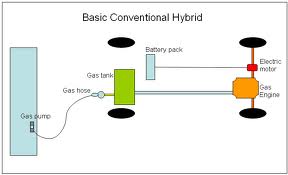Now that we have an understanding of the technology hidden behind the world of hybrid vehicles, let’s have a look at the different types. The reality is that, not all hybrids are created equal! Hybrid cars are categorized based on their degree of hybridization and the drivetrains that they utilize. There are many kinds of hybrids, the main ones are; conventional hybrid, mild hybrid, full hybrid, and plug-in hybrid.
Conventional Hybrid:
Conventional hybrids are the most basic kind of hybrid vehicles out there. They utilize only two forms of hybrid technology; idle-off capability and depending on the vehicle, a system that sacrifices fuel economy for acceleration. As I mentioned in the previous post, idle-off capability is the cars ability to shut off the main engine at times when it is not needed, such as in heavy traffic, low speeds, or stop lights. The second, sacrificing fuel economy for acceleration, allows the car to run faster, but creates a disadvantage as it consumes more gas than other hybrids. Also, this type of hybrid does not allow for plug-in into an electrical source for the battery. Instead, it charges the battery through regenerative braking and and its gas engine.
Mild Hybrid:
Mild hybrids are a step up from conventional hybrids, although they too don’t have full capabilities. Mild hybrids have idle-off capability (like the conventional hybrid), regenerative braking, as well as an electric motor. The difference is that mild hybrids are more focused on fuel economy than conventional hybrids, eliminating the sacrifice of gas for acceleration. The disadvantage is that this kind of hybrid boasts a smaller engine/motor as well as weaker battery, making the vehicle less powerful. Some automakers provide the option to include direct-injection and turbocharging, allowing for them to maintain the same performance level; but of course, this comes at an extra cost. Regardless, it is a good alternative, because you get the main benefits of a hybrid car at lower cost and weight.
(above is chart comparing a mild hybrid vs a full hybrid, which we will cover next. Notice how the mild hybrid as much smaller battery pack and comes with a generator rather than an electric motor.)
Full Hybrid and Plug-in Hybrid:
A full hybrid has the three main features of a mild hybrid, but includes an electric motor, allowing the vehicle to save even more gas, as the electric motor can be used to power the vehicle. The arrangement of its electric motor, engine, and battery system make it so that the vehicle can drive using electricity at low speeds/cruising. If more power is needed, the engine kicks in and allows the vehicle to operate with twice as much power. The vehicles accessories, such as the a/c, windows, and radio are all powered using the battery. This system allows for more fuel consumption under certain circumstances. (The graphic above shows how a full hybrid system differs from a mild-hybrid system.) Plug-in hybrids are nearly identical to full hybrids, but come with batteries that are rechargeable using a wall plug and the vehicle is able to drive for more than 20 miles on electricity alone. Pretty innovative huh?
(above is an image of a plug-in hybrid being charged)
All hybrid vehicles offer innovative dual-source powertrains that will progressively introduce improved performance and efficiency statistics. Cutting-edge hybrid technology promises to be prominent in future, as it satisfies consumers that demand better fuel economy as well s those desiring performance. The future of the automobile appears to be promising, as this is just the foundation of hybrid vehicle technology.
Web Links:
http://www.hybridcenter.org/hybrid-center-how-hybrid-cars-work-under-the-hood.html
http://www.fueleconomy.gov/feg/hybridanimation/fullhybrid/fullhybridoverview.html
http://alternativefuels.about.com/od/glossary/g/fullhybrid.htm
http://auto.howstuffworks.com/fuel-efficiency/hybrid-technology/mild-hybrid1.htm
http://green.autoblog.com/2009/04/30/greenlings-what-is-a-mild-hybrid/
http://newenglandautotalk.com/the-difference-between-electric-and-hybrid-vehicles/
http://www.jdpower.com/content/detail.htm?jdpaArticleId=1384
http://www.altenergymag.com/emagazine.php?issue_number=05.06.01&article=naftc



